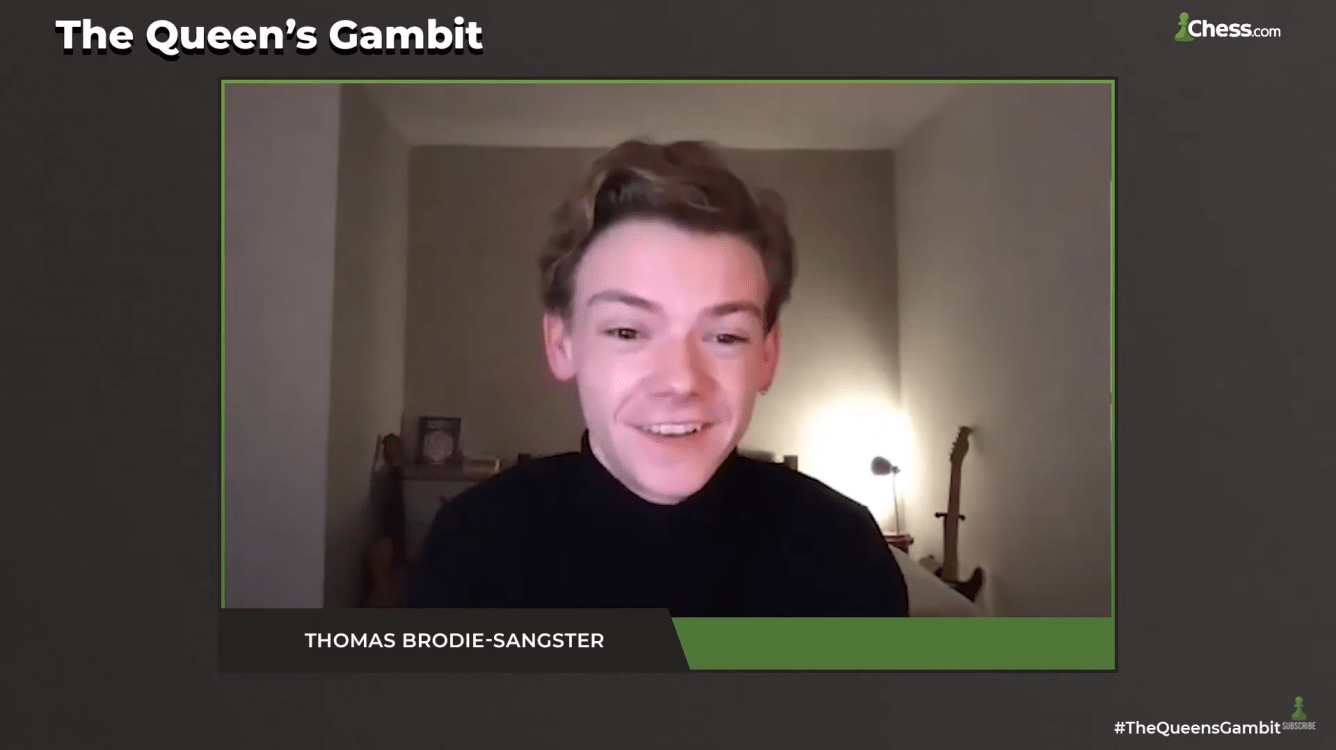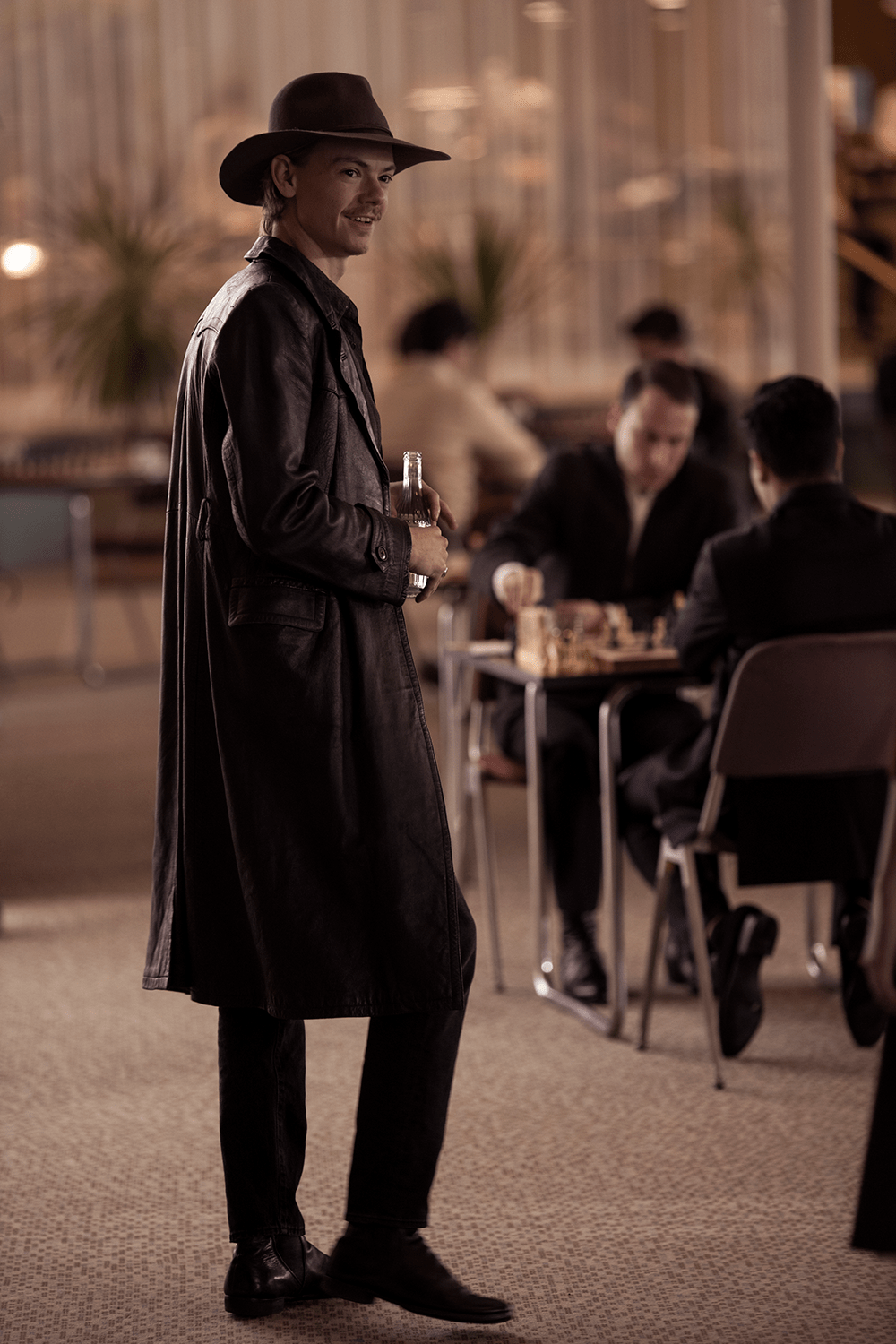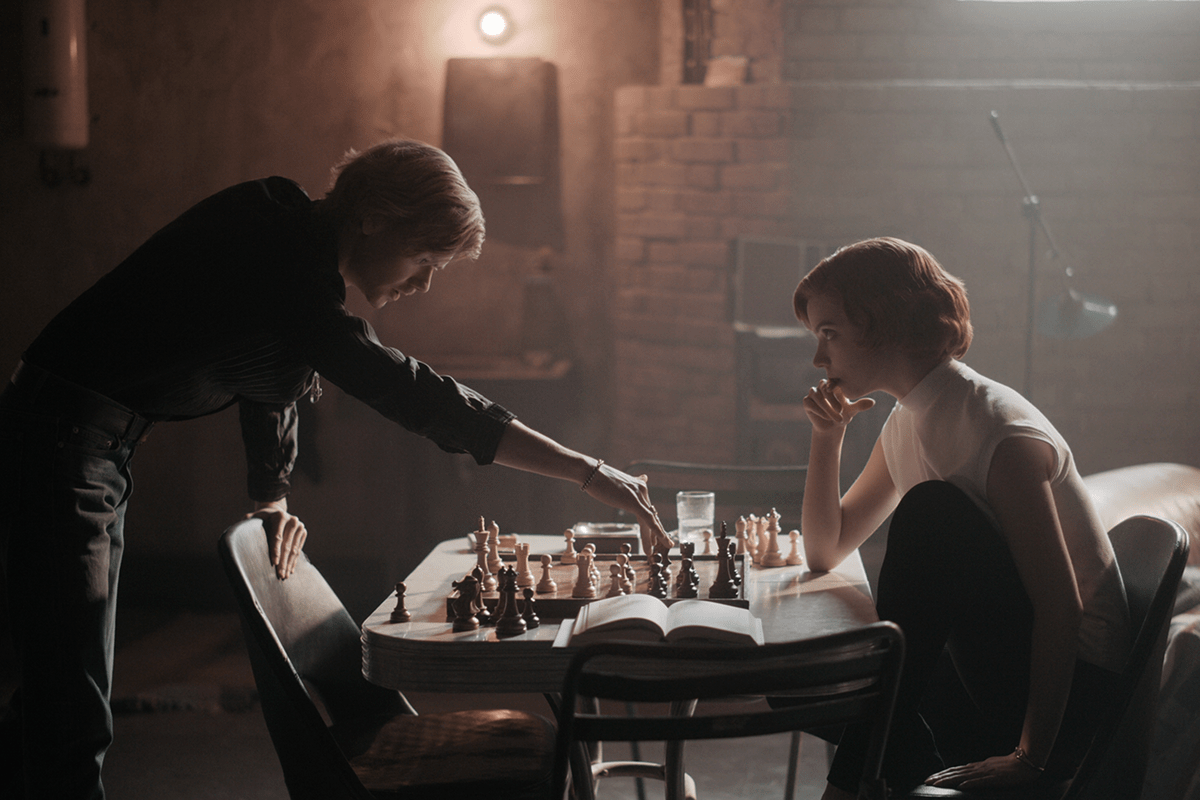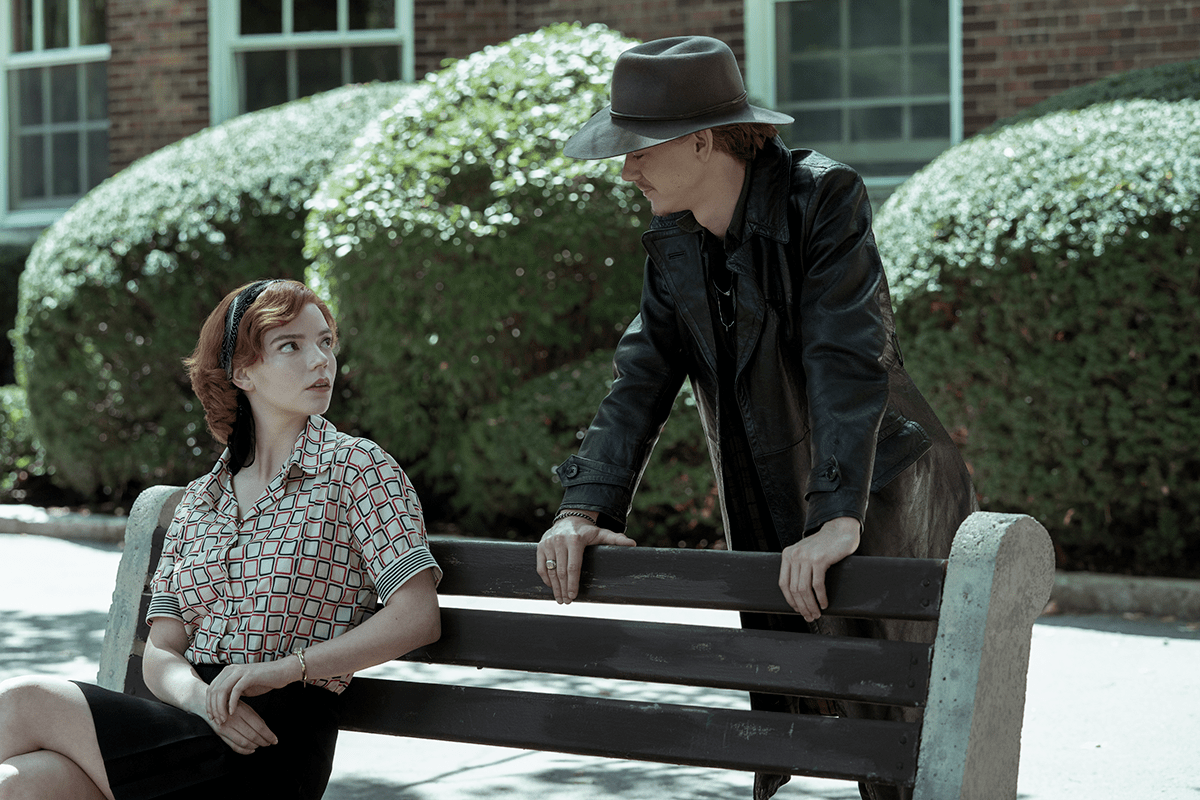
Thomas Brodie-Sangster's Exclusive Interview
You might know Thomas Brodie-Sangster from "Game of Thrones." However, since you're reading this here on Chess.com, you probably know him from the game of kings—and well, the game of queens! Brodie-Sangster is the brilliant Brit who brought the fascinating character of Benny Watts to life in Netflix's miniseries "The Queen's Gambit."
The multi-talented artist was kind enough to talk to me about the show. In this 15-minute interview, Brodie-Sangster shares his thoughts on the show's success, the challenges of portraying a U.S. chess champion, and his thoughts on a conspiracy theory about a particular character.
Brodie-Sangster also shared his newfound appreciation for the game. "I loved it! It's a beautiful game that's been played for hundreds and hundreds of years," the actor said. "I learned the beauty of it."
I loved it! It's a beautiful game that's been played for hundreds and hundreds of years.
And what a beautiful game it is indeed! Brodie-Sangster not only learned to appreciate chess but also helped millions of spectators worldwide to fall in love with the game as well. Check out our chat in the video below, followed by a full transcript:
Mike Klein: Chess.com is here with Thomas Brody-Sangster, who played U.S. champion Benny Watts in "The Queen's Gambit," now Netflix's most-watched scripted miniseries of all time. Thank you, Thomas, for taking the time to talk with me and all of the Chess.com users.
Thomas Brodie-Sangster: Thank you.
I've read that you learned how to play drums for "Love Actually" and that you learned how to play the guitar with your left hand to play Paul McCartney. This role though—you had already played a previous character that was in the chess community—this was kind of like your second time playing a chess character. Did that make it a little bit easier to step into our subculture?
Somewhat, yeah. I mean, the other thing I did, I was playing quite a talented chess player, but it was more about World War Two resistance and it was kind of a side part of it ["Entrusted" -- ed]. It was a kind of hunt between me and a big Nazi band that was kind of coming after me and so there was a kind of crossover between that and the chessboard. This was much more chess focused.
I see. These three disciplines though, what is more difficult to make look convincing on camera? Drums, guitar with your left hand, or chess?
That's a hard one. You just want to do the best that you can do to the ability. That's why I love talking to you because when you're pretending to be someone that is supposedly very good at something, the main person you're thinking of is people who are actually very good at it and you know that they're going to be the ones that pick you apart the most. So whether you're a drummer, a left-handed guitarist, or a big, big chess player, you're going to be very critical. So that's your main kind of audience that you're going for.
When you're pretending to be someone that is supposedly very good at something, the main person you're thinking of is people who are actually very good at it and you know that they're going to be the ones that pick you apart the most.
Drums, you literally have to hit them. So, if you aren't on time, it doesn't look right. So you have to be perfect. With chess, it's more about the finesse and being able to kind of just look confident moving chess pieces around the board. In terms of actually learning openings, or really understanding the games in which you're playing and the reason for taking each piece was kind of not quite as important. And I suppose fingers on a fretboard are important but less obvious than drumming. So I'd say drumming, probably.
You're exactly right, it's very hard to please any subculture when a movie is made about it. But, I don't know if you know this, this series has been heaped with praise from inside the chess community for accuracy and the feel of being at a tournament so you deserve the credit for that.

There's been a lot of movies that have been made about chess during your lifetime. Some of them have even been big Hollywood releases, but nothing has done what "The Queen's Gambit" has done to grow chess. I mean, it's hard to even buy a chess set, they're all sold out. Our website traffic is getting five times the normal number of users. So my question is why "The Queen's Gambit?" Why do you think this was different from all the other chess movies and series?
To be honest, I don't really know. All I do know is that the people who made this show were all phenomenally talented. All of them were very willing, and wanting of creativity, of wanting to tell a story and wanting to do it right, and do it justice. Although it's very, very chess focused—that was a very important thing to get right—it was also just as important to make sure that it came across as a real story, as you are watching human beings. Then there's also getting the period correct, you know. So everyone that came together to make this project did their utmost to make it as realistic, even though it's actually heightened, you know, it's a very stylized piece as well. I mean, so it's not super realistic, but it taps into a sense of reality that I think is key to making something successful.
People only enjoy watching stuff if they can relate to it, or if they can somewhat understand it. So making a movie or a show requires a huge collaboration of a lot of people. And bringing those people together so that they all work in unity is very, very key. That's what we experienced on set. And the fact that that translated to the film is kind of no surprise. The surprise is that it did very, very well and people seem to love it. I knew that it was going to be a good piece, but I thought it would be in a very kind of cliquey, you know, small world of an audience. I didn't realize it would have the reach that it does, but I think the reason that it does is because it's just done well.
Makes sense. In a previous interview, I've heard you praise the hyperrealism that was assisted by some of the chess consultants; I've interviewed Bruce Pandolfini about it. Can you point to one or two things that he specifically taught you that helped you become Benny Watts as a chess player?
Well, we played several times just back and forth. I would just take pieces and then he'd go "No, no, no, no. That was rubbish. That was rubbish. Do it again." And I'd do it again, and he'd say "Oh, that was it. That was it!" I was like, "I didn't really see the difference," and he was like, "Do it again!" And then, I did it again and he said "No, no, no, that was rubbish. Do it again. Do it again." And we'd just take pieces over and out. He said "Get used to the weight of the pieces in your hands because you're playing someone that has moved these pieces around for years and years and years, and studied and studied and studied, and probably has a relationship with each piece. You know your relationship with your rooks or you have a favoritism of your bishops; you know which pieces you like the most."

And so although I wasn't really learning how to play chess, I was learning what a chess player may fall in love with about the game. I think that was quite clever because there was nowhere near enough time to actually really, truly understand the purpose of every move and what it all meant; that takes years and years and years of understanding and playing. So what he did is like, kind of try to teach us how to fall in love with the game and how to look like you know exactly what you're doing.
Although I wasn't really learning how to play chess, I was learning what a chess player may fall in love with about the game.
And so with that, there's an element of technique, but then there's also an element of flair, and they were quite good; all of the chess team were quite good at working with us to try and create individual flares of how we might take pieces, how we might hit the clock. Like Beth knocks over other people's kings, which is just outrageous, but that's her little thing and that adds to it, it adds to her own little technique. They were very good at trying to figure out everyone's own little way of playing.
So I'm curious, did you, either by osmosis or intentionally, become a slightly better player? Did you play some fun games off the set?
Yeah, no, no, I did! And I even learned a couple of openings, which are completely gone now. But at the moment, yeah, we were playing with some great players and we were very much invested in that world. And I was excited by it, I loved it! I saw it as, you know, it's a beautiful game that's been played for hundreds and hundreds of years, and it's infinitely complicated. The knowledge that you have to understand and the memory of each game that's been played in the past, and then kind of put that into a reflection of what you need to do in front of your board. And it's just moving bits of wood around a board, that's all it is, but I learned the beauty of it. That's what I would say.
That's great to hear. There's a scene where you play what we call a blindfolded game in a car with Beth—it doesn't literally mean blindfolded, it just means without the use of a chess set—but, this is a skill that comes to all chess players without ever intentionally trying to do it. It's a bit like taking the tube every day and at some point, you just know the system of London, it just happens. So I'm curious, were you around the chess enough throughout the months of filming where you can kind of close your eyes and see a chessboard, and if I say "pawn to king four," you can visualize what that looks like? Did you have enough chess in you to be able to do that?
No. In fact, those lines were some of the hardest lines to learn, because to me, it was like code, and if you got one wrong the whole thing didn't make sense. So it had to be spot on, perfect. So it was a very hard thing to learn. I just learned them as lines. I was not visualizing them on a chessboard at all. No, I was completely incapable of doing that.
That's all right. It takes years for most of us. So, in this series, fashion is kind of like its own character and you were, I don't know, maybe like an Indiana Jones. But I want to ask about the knife, whose idea was it to add the knife to your wardrobe?
It was Scott [Frank, writer and director -- ed] and, you know, it never comes out. It stays sheathed the whole time. It's a weird one, it's a strange one. But I think it's just his own weird little defensive thing. It's another prop that he uses to kind of unsettle people and to make people ask questions.
I mean that that character, he doesn't fit the archetype of a chess player. And I think he does that intentionally, it's probably a tactic. I think it's a tactic to unsettle his opponent. The fact he's just bizarre-looking, strange-looking, and he carries a knife, I mean, why would you need a knife? And the fact he never uses it, he never peels an orange, he never does anything with it, it might not even be real. I don't know.

I'm going to ask you a bit of an outlandish theory that I have. In my first viewing of the series, right before you played the big game against Beth in Ohio with the U.S. Championship, you got your two characters to play a series of blitz chess, or speed chess, matches, and you win all of them. It's almost like you're hustling, or you're taking her $5 every time. I'm just wondering though, in like Washington Square, New York City, sometimes hustlers, they do the typical hustle: They lose a bunch of games until they raise the stakes. I'm just wondering, I don't know if Beth's character was sophisticated enough, but could she have lost those games to you on purpose to be able to beat you the next day in the event where it really mattered?
Oh, I don't know. I don't think so. It's a good point, I don't think she'd ever heard of speed chess or blitz chess. I think I basically hustled her knowing that she... I think it was also mainly to kind of slightly unsettle her for the next day when we were actually playing the real game, so by that point, I had already beaten her 10 times or something.
So, I think it was more to kind of see how she played and to slightly unsettle her. I don't think she lost on purpose; I don't think she likes losing. I mean, actually most chess players I've met during this whole thing despise losing, it really gets to them. Which I found quite... I mean, anyone that competes in anything, I think just hates losing.
It's very visceral. One more idea, this was not my idea and has nothing to do with your character, but is there any chance that Cleo is a KGB agent? Because that's actually, if you read anything about Cold War-era chess, KGB agents were absolutely at the tournaments. So I'm just curious if that could be right.
Well, there's another good spot. I have no idea. Oh, I like that. I'm going to say yes because I liked that as a sub storyline.
I'm going to ask you a question about your subculture that I know very little about. But in the chess world, when two chess players meet for the first time, we always know each other's rating or maybe even their title in chess and so it's a very hierarchical game. You can almost never be equals with somebody because I know your rating and you know mine. Is it like that in the acting world, I'm guessing you don't bump into people and you know exactly how many BAFTAs they've won or something, but is there any sort of hierarchy like that in your world?
No. Well, there probably is. I mean, there's ego, there's lots of ego. I don't really care about that too much. I also don't get that starstruck over people. I only judge people on whether they're a nice person and then whether they're talented and whether I can, you know, work with them and bounce off of them and have fun and play in a scene.
To me there isn't really a hierarchy. I mean, when you join a job, you know, there's the star. And then on the call sheet, you've got number one, two, three, four, or five. So you're number eight and they're number one. But I mean, that's it, it's a bit of a joke really. It depends on how much of an ass they are, but most people actually aren't, most people are very nice people. Actors are perhaps a little insecure but tend to not be assholes. They tend to be quite nice people, I think. And they just want to play and experience.
Actors are perhaps a little insecure but tend to not be assholes.
They're quite excited to get to work with someone new. I mean, that's how I feel. And that's how most of my experience with others is that if you've watched other actors, or if you know other actors, you're more excited to work with them because you get to see how you react with them in a scene.
It's, it's more of an exciting thing than, a one-upmanship. There is no way of kind of winning at acting.
That's good to hear. In another interview, you said that as a boy, you played draughts or, as we call it, checkers; that game is very complex. Is it complex enough where a series like this could be made out of draughts or has chess just got that next level of complexity that makes the series what it was?
I think it's also got more character to it though as well. I mean that there are literally different characters on a chessboard. I just think it's a little bit more of an interesting game. Visually, just the pieces are more interesting as well. It's a bit more famous. I don't know, I mean, quite possibly you can make a movie about anything. As long as it's well written and well acted and well shot, it doesn't really matter too much what it's about. So yeah, I would say so.

Fantastic. I'm just going to ask you one more question. It's something I've wanted to know. Hopefully the Chess.com users do too. If we had a chess tournament with all of the actors, not counting any of the professional chess consultants, like Bruce, who would win that chess tournament?
I never played him, but apparently Jacob, I can't remember his second name now. Jacob who plays the photographer guy? I can't remember his character’s name either. Bloody hell. [The actor's name is Jacob Fortune-Lloyd, who plays D.L. Townes - ed.] Apparently, he's quite good. Yeah, I never played him, but apparently, he's actually bloody good. So I would say, him.
Fantastic. Maybe we'll have to organize that someday. Well, thank you so much, it's hard for me to express how much you've done for the chess community. It's been awesome to see.
That's great. I'm really glad to hear that.
I wish you well in your career. Thank you, Thomas Brodie-Sangster for spending some time with us.
Thank you very much.






